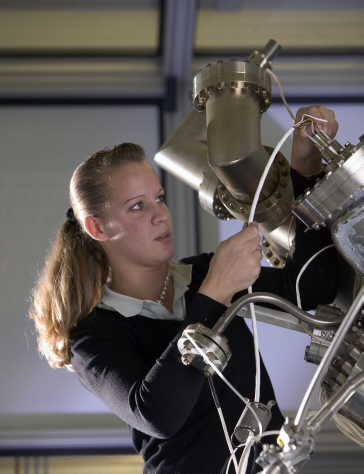Experiencing the own discipline not only as a building of findings, but exploring knowledge – this is “explorative learning”. This modern type of learning will be in the focus of the “State-wide Day of Teaching” that will take place for the first time at KIT (Audimax) in Karlsruhe on Friday, November 14. The Baden-Württemberg State Minister of Science, Professor Peter Frankenberg, will hand over the state teaching awards at the beginning of the event.
The Day of Teaching is organized every year alternately by one of the universities in Baden-Württemberg. It is part of the teaching alliance, by means of which the nine universities and the Ministry of Science wish to strengthen teaching at the universities in Baden-Württemberg. Focusing on the student is the objective of explorative learning. It is achieved either by simulating a teaching situation close to research or by the active participation of students in research projects. “This is the modern type of university education – also in the new bachelor and master studies courses”, underlines Professor Jürgen Becker, Vice-President for Teaching Matters of the Universität Karlsruhe. Hence, the leitmotif of education at KIT is “education follows research”.
Presentations and discussions during the first half of the Day of Teaching will concentrate on the boundary conditions to be created to bring teaching in line with problem-based learning. Professor Anette Kolmos will present the University of Aalborg in Denmark as an example. “Moreover, it will be focused on how explorative learning can be integrated in own lectures”, says the head of the Karlsruhe Office for University Didactics and Advanced Scientific Training of the Universität Karlsruhe, Anke Diez, who organizes the Day of Teaching at KIT together with her team.
Successful examples, so-called best-practice models, will be presented at the workshops in the afternoon and will demonstrate how exciting learning may be. Matthias Schlipf, lecturer at the KIT Institute for Production Technology, for example, constructed a functioning Stirling engine together with 15 students. This project lasted a complete semester. The Stirling engine is not larger than a 1-cent coin and, hence, one of the smallest functioning Stirling engines existing. It may be used in medical engineering, for example. “Of course, preparations of this project were associated with a significant expenditure, but it is worthwhile, when you see how committed the students are and how much they will profit in the end!”, emphasizes Schlipf, who will offer the seminar again in this semester.
Matthias Schlipf is one of the participants in the job-accompanying program of the Baden-Württemberg University Didactics Center (HDZ), in which the nine universities of the state are cooperating to identify new approaches to teaching. Together, they have been offering a comprehensive program to scientific employees, lecturers, and professors for eight years now. Under this program, the participants extensively analyze the role of the teacher over a longer term. The Karlsruhe participants will now receive their certificates for university didactics on the Day of Teaching.
Registrations for participation in the Day of Teaching and the individual workshops can be found under www.kit.edu/tagderlehre. Here, the detailed program of the workshops can be found as well.
The Karlsruhe Institute of Technology (KIT) is the merger of the Forschungszentrum Karlsruhe, member of the Helmholtz Association, and the Universität Karlsruhe. This merger will give rise to an institution of internationally excellent research and teaching in natural and engineering sciences. In total, the KIT has 8000 employees and an annual budget of 700 million Euros. The KIT focuses on the knowledge triangle of research – teaching – innovation.
The Karlsruhe institution is a leading European energy research center and plays a visible role in nanosciences worldwide. KIT sets new standards in teaching and promotion of young scientists and attracts top scientists from all over the world. Moreover, KIT is a leading cooperation partner of industry.

